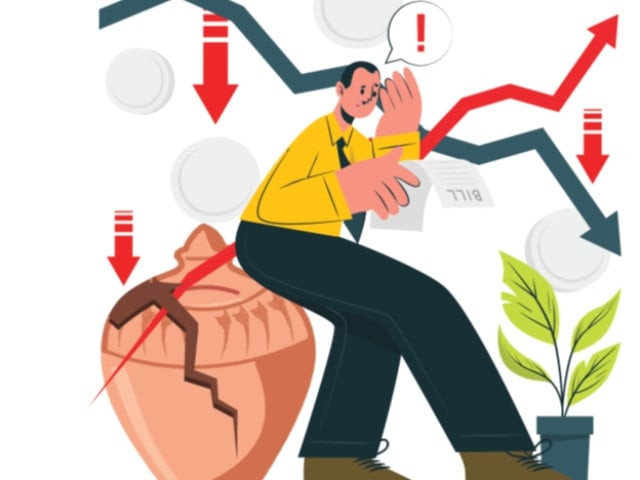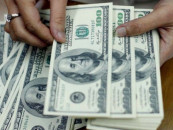Food prices as big a concern for consumers as energy bills
Inflation surges to 27.4% as ministry attempts to downplay sugar crisis

As the inflation rate soars to 27.4% in August on the back of higher food and fuel prices, the Ministry of National Food Security on Friday attempted to downplay the sugar consumption figures by 125,562 metric tons apparently to hide anticipated shortages due to its export.
The stubbornly high grocery prices mean the cost of the monthly shop is now as big a concern for consumers as energy bills.
The Pakistan Bureau of Statistics (PBS) -- the national data collecting agency -- reported that the Consumer Price Index rose to 27.4% last month compared to a year ago.
This was the second month when the inflation reading remained far above the official target of 21% due to an administrative increase in the prices of electricity and fuel.
The higher prices of non-perishable food items and currency devaluation was also significantly contributing to the high inflation tide. The impact of a record Rs305 per liter petrol price is not yet captured in the inflation index.
People living in rural areas have been hit the most, as the average increase in the prices of goods and services that they used increased by 31% last month. The majority of the population still lives in rural areas.
Pakistan’s annual inflation rate accelerated to the history’s highest ever level of 38% in May due to supply shocks, currency devaluation and the absence of any checks on hoarding and profiteering.
The inflation rate jumped to 25.6% in the cities, according to the PBS. The food inflation jumped to 40.6% in rural areas and it remained at 88.8% in cities, according to the PBS.
Meanwhile, the Ministry of National Food Security in a statement clarified its position on the issue of the recent wave of price hike of sugar –- an attempt that has further messed up the issue.
The “estimated monthly national consumption (of sugar) is 0.60 million metric tons per month”, stated the press release. It added there are verified balance stocks of sugar of 1.815 million metric tons with the sugar mills (excluding the stocks in trade), which are sufficient till the start of next crushing season in November,2023 against the total requirement of 1.8 million metric tons till the end of November, 2023.
However, on August 28 –- hardly four days ago -- in a summary to the Economic Coordination Committee (ECC) of the cabinet, the Ministry of National Food Security stated that the monthly consumption was “641,854 per metric tons”.
Within three days, the ministry has understated the consumption by 6.5% or 125,562 metric tons till November 30,.
In January this year, the ECC had allowed export of 250,000 metric tons of sugar on the assurance that there will be roughly 1.3 million metric tons stock available to be sufficient for two months of consumption at the start of new crushing season.
The food ministry stated that all the four provinces have confirmed the availability of sugar stocks in today's National Price Monitoring Committee Meeting.
It said that the government was vigilant regarding the stocks and availability of sugar in the country. It said that the current price hike of sugar in the market was artificially caused due to the smuggling, hoarding, and market manipulations for profiteering.
The PBS reported on Friday that sugar was available at Rs180 per kg in Karachi and Rs190 per kg in Quetta -- a rate that was just Rs85 in January this year.
The food ministry further claimed that adequate stocks of sugar are available in the country. At the start of the crushing season, there was a carry forward stock of 990,000 metric tons from the last crushing season of 2021-2022, during the current crushing season 6.74 metric tons of sugar is produced in the country, it added.
“The government has no plan to import sugar, in this regard the letter of Trading Corporation of Pakistan is being misquoted”, said the Secretary Food Mohammad Mehmood.
The Ministry of National Food Security & Research has already requested the provincial governments for price fixation and its enforcement, as per law and strict action against hoarders and price manipulators, who are creating panic in the market for their own vested interests, said the ministry.
The ministry blamed the sugar hoarders for the current price hike and said that they should immediately release the stocks as per the demand of the market to stabilise the commodity price.
The government has also initiated action against all the elements involved in smuggling of the commodity, in this regard the Ministry of Interior has already initiated action, it claimed.
The global commodity prices, withdrawal of subsidies, increase in electricity, gas prices and the currency devaluation were the main reasons behind the higher inflation in Pakistan, the national price monitoring committee was briefed on Friday.
One of the charges against the government of Pakistan Tehreek-e-Insaf was that it failed to contain inflation which, at the end of its tenure, was 13.4%.
Excessive note printing is also a reason behind rampant inflation in Pakistan. The central bank had set the interest rate at 22% -- the highest in the history of Pakistan but it could not arrest the index. The SBP is going to announce next monetary policy this month, which will give an indication about the government’s future priorities.
There were hardly any consumable goods that had not seen their price shot up in recent months.
The core inflation, which is calculated after excluding the volatile energy and food prices, increased in August to 18.4% in urban areas and 25.9% in rural areas -- far above the central bank’s interest rate. Despite constantly increasing the interest rates, the core inflation has not receded that should be a matter of concern for the monetary policy committee members.
There was a huge increase in the food inflation rate, mostly because of disruption of supply chains and weak checks. The prices of food and non-alcoholic beverages increased 38.5% last month.
The inflation rate for the transport consumer price group was 23% on the back of constant increase in fuel prices.
For the July-August period of the current fiscal year, the data showed that the average inflation rate stood at 27.84%, which was far higher than the official target of 21% for the current fiscal year.


















COMMENTS
Comments are moderated and generally will be posted if they are on-topic and not abusive.
For more information, please see our Comments FAQ